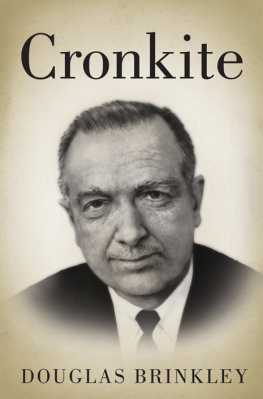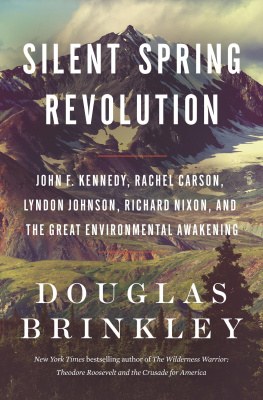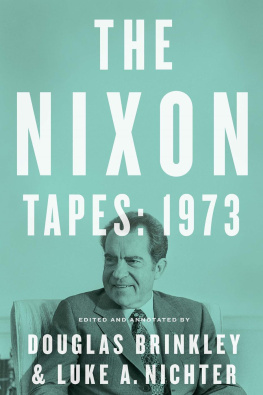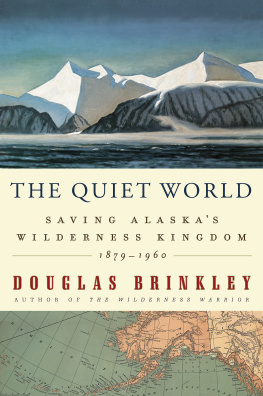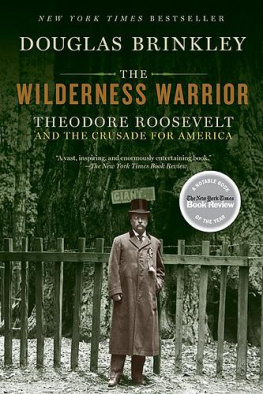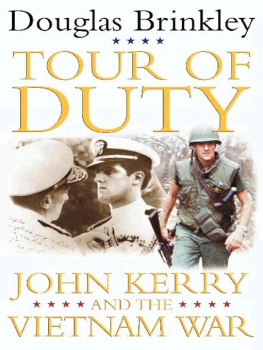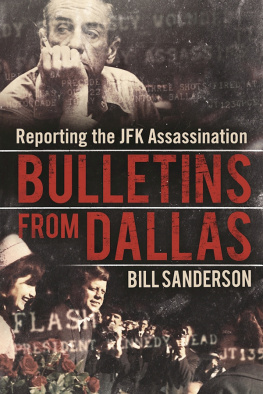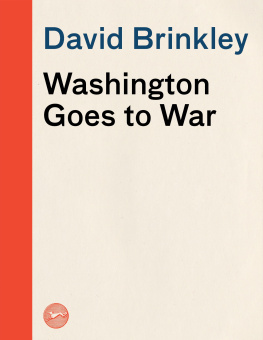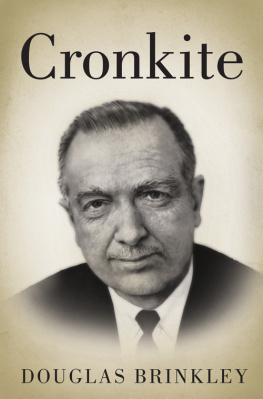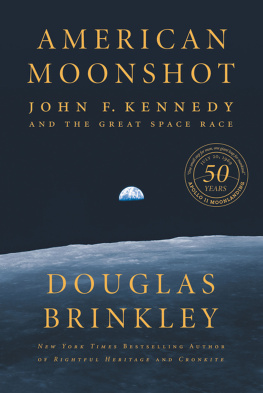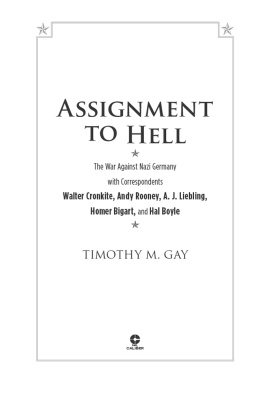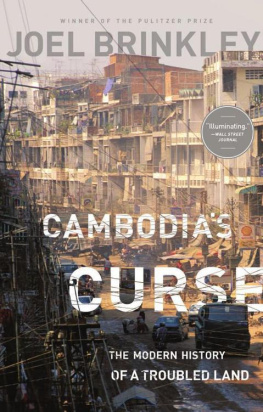D OUGLAS B RINKLEY is a professor of history at Rice University and a contributing editor to Vanity Fair . The Chicago Tribune has dubbed him Americas new past master. His most recent books are The Quiet World , The Wilderness Warrior , and The Great Deluge . Six of his books have been selected as New York Times Notable Books of the Year. He lives in Texas with his wife and three children.
Visit www.AuthorTracker.com for exclusive information on your favorite HarperCollins authors.
Australia
HarperCollins Publishers (Australia) Pty. Ltd.
Level 13, 201 Elizabeth Street
Sydney, NSW 2000, Australia
http://www.harpercollins.com.au
Canada
HarperCollins Canada
2 Bloor Street East - 20th Floor
Toronto, ON, M4W, 1A8, Canada
http://www.harpercollins.ca
New Zealand
HarperCollins Publishers (New Zealand) Limited
P.O. Box 1
Auckland, New Zealand
http://www.harpercollins.co.nz
United Kingdom
HarperCollins Publishers Ltd.
77-85 Fulham Palace Road
London, W6 8JB, UK
http://www.harpercollins.co.uk
United States
HarperCollins Publishers Inc.
10 East 53rd Street
New York, NY 10022
http://www.harpercollins.com
I began this biography at the suggestion of the late David Halberstam. We were driving from New Orleans to Baton Rouge for the Louisiana Book Festival, drinking Starbucks coffee and swapping road stories, just killing time on I-10. Conversation turned to the relationship between the White House press corps and U.S. presidents in the age of television. Somewhere around Gonzales, Halberstam, whose The Powers That Be is the classic study of modern U.S. media history, made the bold claim that Walter Cronkite was the most significant journalist of the second half of the twentieth century. He felt that although Ronald Steel had written the definitive Walter Lippmann and the American Century and Joseph Persico had excelled with Edward R. Murrow: An American Original , no one had adequately tackled the life and times of Cronkite. I was intrigued. A few days later, I made a preliminary call to my agent of twenty-two years, Lisa Bankoff of ICM, to see if there was a Cronkite biography in the publishing world pipeline. She cast a wide net and came back with a no. I was off and running.
By happy coincidence, Cronkite had just donated his extensive papers to the Dolph Briscoe Center for American History at the University of Texas at Austin. Although Cronkite didnt graduate from UTor any college, for that matterhe had spent two years at the school, from 1933 to 1935, taking classes and working for its student newspaper, The Daily Texan . His love for his alma mater was fierce. I telephoned the Briscoe Centers director, Professor Don Carleton, a first-rate historian, about the possibility of writing a biography of Cronkite. He was extremely enthusiastic about the idea. Someone, he believed, needed to take on the massive assignment. It was long overdue.
What made the Cronkite project appealing, other than Halberstams belief that the CBS newsman was so historically significant, was the fact that the UT trove included such excellent artifacts as Cronkites dozens of letters home from Europe during World War II; internal CBS memos; production materials from Cronkite series such as You Are There , Eyewitness , and The Twentieth Century ; private photographs documenting his early life, his United Press clippings from the 1930s and 1940s, personal scrapbooks and his reportorial notebooks from Vietnam; fan mail dating from the 1950s to the 1980s; and personal correspondence with the most famous journalists, political figures, and entertainers of his day. Because Carleton is trying to turn the Briscoe Center into a top-tier depository of new media history, he has recently acquired the papers of many of Cronkites friends and colleagues, such as Andy Rooney, Harry Reasoner, Joe and Shirley Wershba, Robert Trout, Sig Mickelson, and Morley Safer, as well. This made for great one-stop shopping.
While working on Cronkite , Carleton asked me to serve as a fellow at UTs Briscoe Centeran honor I gladly accepted. Office space, as well as a parking spot, copy machine, and phone serviceall the perks a research scholar needswere generously provided. The staff at the Briscoe Centerled by Carletonis amazing. Thanks are in order to Margaret the Magnificent Schlankey, Erin Purdy, Brenda Gunn, Aryn Glazier, Roy Hinojosa, Amy Bowman, Stephanie Malmros, Evan Hocker, and Teresa Palomo Acosta. Dons daughter, Aunna Carleton, a close friend of my family, helped find old New York Times stories and checked out books from UT on my behalf.
In July 2007, I was hired by Rice University as a tenured professor of U.S. history. Every fall semester I teach three courses: History of the Cold War (HIS352); Twentieth-Century Presidents (HIS291); and U.S. Conservation History (HIS425). This leaves me free to research and write from January to August without classroom responsibility. Although Rice is in Houston, I own a home in the foothills of Austin, just a few miles from the Cronkite archive at the University of Texas. Im frequently shuttling between Austin and Houston along Highway 71 and I-10a commute of two and a half hourswhich can be tedious. To pass the time, I listen to a lot of folk, jazz, and NPR. But there is a wonderful upshot. The Brinkley family can now claim personal friendships in two great communities: Austin (Westlake and Rollingwood) and Houston (River Oaks and West University).
Scores of producers, writers, reporters, executives, and archivists at CBS News are personal friends. They helped me in myriad ways. Bill Fellingthe national editorhas been a dear and constant friend. (I hope he listens to the audiobook of Cronkite on his commute from New Jersey over the George Washington Bridge to midtown Manhattan.) Im frequently on the CBS Evening News with Scott Pelley , CBS This Morning (with Charlie Rose, Erica Hill, and Gayle King), CBS News Sunday Morning (Charles Osgood), and Face the Nation (Bob Schieffer). This association has enhanced my understanding of the frenetic work milieu at West Fifty-seventh Street. A special thanks to CBS News president David Rhodes (a Rice alum), Jeff Fager (chairman and executive producer of 60 Minutes ), Al Ortiz, Michelle Miller, Rita Braver, Charles Osgood, Bob Schieffer, David Farber, Jeff Glor, Bill Plante, Jim Axelrod, Byron Pitts, Bob Simon, Betty Nguyen, Steve Kroft, John Dickerson, Lara Logan, Norah ODonnell, Bob Fuss, and Chip Reid.
To wade into Cronkite leavings in both New York and Austin, I tapped my longtime friend Julie Fenster of New York for assistance. I first met Julie back at American Heritage magazine many moons ago, and we have been steadfast allies ever since. She has been my committed partner on this biography, researching obscure facts, helping organize chapters, and offering her shrewd insights into the history of American journalism. Her editorial skills and historical judgment are awesome. I never could have sifted through the seas of Cronkitiana without her. She was indispensable.
Starting in the fall of 2010, Sara Haji, a recent graduate of the University of Texas at Austin, became my personal assistant. Sara, now a law student at the University of California at Berkeley (and clerking for the Federal Trade Commission during the summers to boot), was recommended to me by my friend Katrina vanden Heuvel of The Nation (thank you, Katrina), and was a phenomenal asset. Sara worked with me at the Briscoe Center, rifling through boxes of material, collecting and compiling photos, and setting up interviews (all of which I personally conducted). She ended up naming her white Toyota Cronkite.
In July 2011, I received amazing assistance from Virginia Northington, a recent graduate of the Plan II Honors program at the University of Texas at Austin. Virginia is blessed with a keen grasp of history, literature, and journalism that belies her young age. Her honors thesis at UTLiterary Naturalism in the Interwar Novels of Jean Rhysis a revisionist study of the distinguished author of Voyage in the Dark. With Virginia, there was no learning curve . From the get-go, she helped me transform Cronkite from a diffuse first draft into the carefully copyedited final manuscript. Punctual, brilliant, and always in work mode, she made our collaboration one of the high-water marks of toiling on this book. Because Virginia has a great love for marine conservation, I look forward to working with her on Silent Spring Revolution , the third volume of my Wilderness Cycle.
Next page
